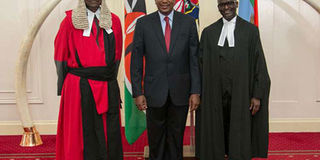Kenya needs more Lenaolas in positions of authority

President Uhuru Kenyatta with Chief Justice David Maraga (right) and Justice Isaac Lenaola during the swearing-in ceremony of Justice Lenaola as a Judge of the Supreme Court at State House, Nairobi on October 28, 2016. PHOTO | SAMUEL MIRING'U
What you need to know:
- He doesn’t tolerate the usual lawyer tricks of asking for adjournments.
- The biggest frustration that many people have with the court system is the long time that’s taken before cases are settled.
- Justice Maraga does not seem a bad choice because by all accounts he is a man of integrity as well.
It is not every day that you walk into a restaurant and hear people loudly praising a judge of the High Court.
That’s the experience I had a few years ago on a trip to Machakos when I listened in as a group of gentlemen gushed about the performance of Justice Isaac Lenaola.
He is so pragmatic, one of them said. He works really hard. He doesn’t tolerate the usual lawyer tricks of asking for adjournments.
Justice Lenaola deserved all that praise because of the extraordinary work that he did in helping to clear the case backlog in Machakos.
The word extraordinary is applied loosely here because it shouldn’t be an exceptional thing that a judge turns up to work early and insists on justice being served in good time. But because it is so rare, Judge Lenaola won many friends for his approach.
He did the same thing when he went to Embu, prompting lawyers in Meru to lobby for his transfer there. He again proved a capable and dependable figure as he did later when posted in Kakamega.
A court reporter told me how the judge ended a long-running family dispute involving a prominent city businessman’s vast estate.
Justice Lenaola asked the family members to retreat to his chambers, without their lawyers, and proceeded to give them an honest talking-to.
He explained that at the rate their case was circling around the courts, they would soon have no estate to fight over because the lawyers would take all their money.
He urged them to strike a deal to share the estate between themselves and blood relatives that had walked into court unable to exchange greetings walked out arm in arm hugging each other. The case was soon settled.
Kenya sorely needs more leaders like Lenaola that ally a sharp brain with some pragmatism and understanding of the context in which they operate.
The biggest frustration that many people have with the court system is the long period that’s taken before cases are settled.
If an injunction is issued against one party, the party that filed for the injunction has essentially won the case because you can expect the matter to rumble on in the courts for years.
In this respect, we have much to learn from countries such as Rwanda. They have placed a six-month deadline for the settlement of cases and, since 2013, annual assessments by Transparency International have found that the “vast majority” of cases are settled within that period.
Such reforms would be dearly welcomed by many Kenyans. Dr Willy Mutunga was an excellent choice as the first Chief Justice under the new Constitution. Incorruptible, de-ethnicised, he laid a good foundation for his successors.
PRAGMATIC APPROACH
I was hoping Justice Lenaola would succeed him to bring a more pragmatic approach primarily geared at speeding up the wheels of justice. It was disappointing that the received wisdom about his possible candidature was that he was “too young”.
Still, Justice Maraga does not seem a bad choice because by all accounts he is a man of integrity as well.
The new CJ and (hopefully the future one in Lenaola) should speed up basic reforms that affect people’s lives such as the instant payment of fines, the digitisation of records and other such moves to offer wananchi a Judiciary that is more responsive and efficient than the one we have.
***
The other day, I needed to make a payment to someone and decided to deposit the funds in their account.
I showed up at what I assumed to be a bank branch at The Oval in Westlands and walked into what seemed to be a science fiction movie.
There were no tellers in sight. Just a bank of ATM-like machines with labels for different types of transactions.
I decided to give it a try, typed in the payee’s bank details, was instructed by a robot to insert the funds, they were counted out after a few tries and, voila, the funds reflected in the other party’s account.
Many people dismissed fears at the start of the IT revolution that machines would end up taking many people’s jobs. Those worries no longer seem so far-fetched with automation in many industries in the West having seen many blue-collar workers replaced by robots.
It is a factor that helps to explain the rise of extreme rightwing politics in the West as workers have seen incomes disappear or plummet.
If machines continue their march, countries where there is already a big problem of unemployment will have to plan for this future. What’s the answer?
Maybe more students learning IT than training to be bank tellers? It’s hard to tell. Hello, tomorrow.
[email protected] @mutigam





